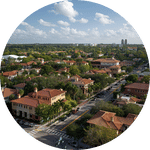Miami-Dade County Real Estate Agent
MiamiHouse Real Estate
Welcome to MiamiHouse Real Estate, your premier partner in navigating the vibrant real estate market of Miami-Dade County. Whether you're buying, selling, or investing, our team is committed to delivering exceptional service tailored to your unique needs. With a deep understanding of Miami's diverse neighborhoods and market trends, we provide expert guidance and personalized strategies to help you achieve your real estate goals.
At MiamiHouse Real Estate, we prioritize transparency, integrity, and client satisfaction. Our dedicated agents leverage extensive local knowledge and cutting-edge technology to ensure every transaction is smooth and successful. Whether you're a first-time homebuyer exploring South Beach, an investor eyeing opportunities in Downtown Miami, or a seller looking to maximize your property's value in Coral Gables, MiamiHouse Real Estate is here to guide you every step of the way. Discover why so many clients trust us to make their Miami real estate dreams a reality—contact us today and let's embark on your next chapter together.
Our Realtor Service Locations

Known for its cultural diversity, bustling nightlife, and significant role in finance, commerce, and international trade. Learn more about Miami Real Estate.

Known for its iconic Art Deco architecture, beautiful sandy beaches, vibrant nightlife, and cultural attractions. Learn more about Miami Beach Real Estate.

Known for its strong Cuban-American community, thriving local businesses, and rich cultural heritage. Learn more about Hialeah Real Estate.

Miami Gardens
Suburban city known for its diverse community, the Hard Rock Stadium, and vibrant cultural events. Learn more about Miami Gardens Real Estate.

Known for its agricultural roots, proximity to the Everglades and Biscayne National Parks, and a family-friendly suburban atmosphere. Learn more about Homestead Real Estate.

Known for its thriving business district, upscale residential communities, and numerous parks and recreational facilities. Learn more about Doral Real Estate.

North Miami
Known for its diverse population, educational institutions, and proximity to Biscayne Bay and natural parks. Learn more about North Miami Real Estate.

Coral Gables
Known for its Mediterranean Revival architecture, tree-lined streets, and upscale shopping and dining options. Learn more about Coral Gables Real Estate.

Cutler Bay
Known for its family-friendly neighborhoods, numerous parks, and proximity to Biscayne Bay. Learn more about Cutler Bay Real Estate.
Real Estate Services
Home Value Estimation
First-time Home Buyer Services
Relocation Assistance
Real Estate Investing
Condo Buying & Sales Assistance
Luxury Property Buying & Sales
Miami-Dade Real Estate Mortgage Rates
Email: [email protected]
Site: www.themiamirealestateteam.com

© 2024 Copyright. All rights reserved